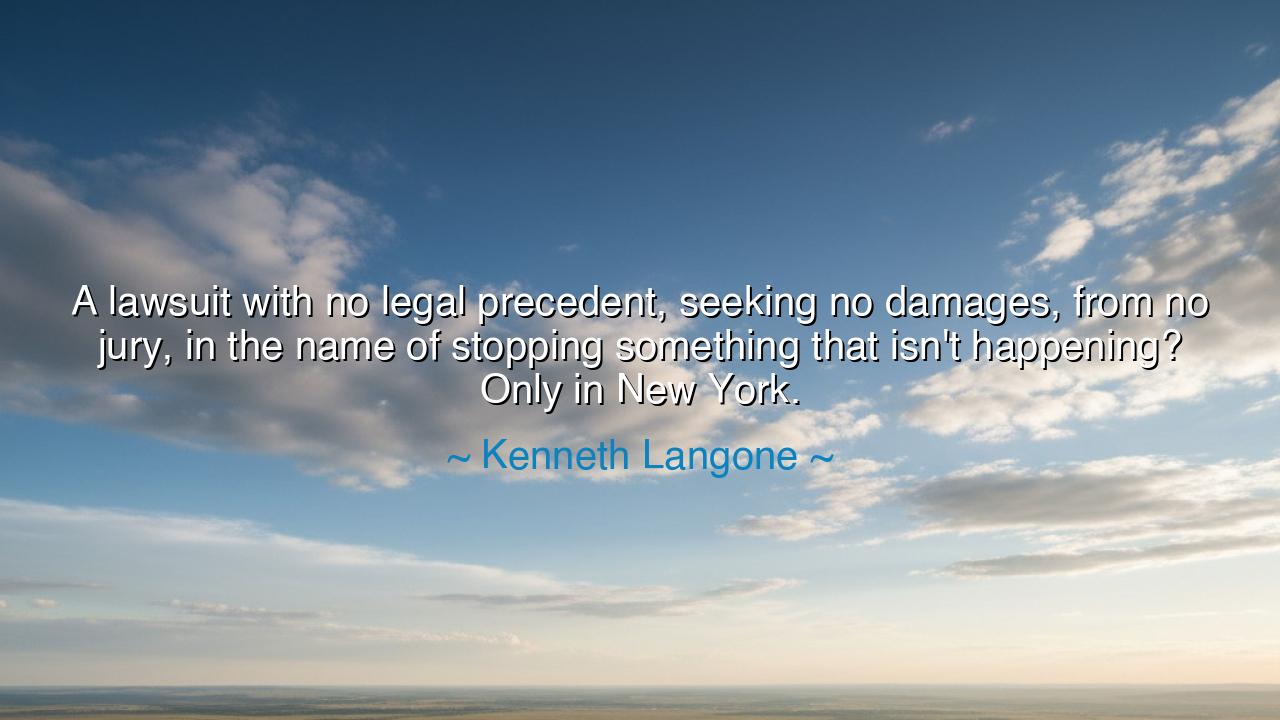
A lawsuit with no legal precedent, seeking no damages, from no
A lawsuit with no legal precedent, seeking no damages, from no jury, in the name of stopping something that isn't happening? Only in New York.






Hearken, O seekers of wisdom, to the words of Kenneth Langone, who, in the midst of the bustling city of New York, cast his gaze upon the labyrinthine halls of justice and observed a peculiar spectacle: "A lawsuit with no legal precedent, seeking no damages, from no jury, in the name of stopping something that isn't happening? Only in New York." In this utterance lies a mirror to the human condition, a reflection of society’s pursuit of action without purpose, a pursuit that dazzles the eyes but burdens the spirit. Langone’s words are a lamentation for reason, a call to see the absurdity hidden within the veneer of civility and procedure.
Long have humans sought recourse in the courts, from Athens to Rome, from the lawgivers of Hammurabi to the assemblies of Renaissance Florence. Yet even then, the law was meant to address the real, the tangible, the grievances that cut through the hearts of men and women. To file a lawsuit not for remedy but for spectacle, not for restitution but for illusion, is to mock the sacred covenant between justice and truth. Langone, with the keen eye of one who has weathered the tempests of commerce and ambition, discerns in New York a peculiar theater where the instruments of law can be wielded not for correction, but for pretense, where precedent is discarded and purpose is replaced with mere motion.
Consider, if you will, the tale of the great American entrepreneur, Kenneth Langone himself, a man who helped awaken the world to the promise of opportunity, who built, brick by brick, enterprises that transformed lives. He saw, from his perch of experience, that many in the city of skyscrapers and ambitions had begun to confuse procedure with justice, believing that the mere act of filing, suing, or contending could suffice as moral action. Like the Roman senators who debated endlessly while the city burned, these actions are hollow without foundation. The lesson is ancient: true justice must be rooted in reality, in tangible harm, and in the wisdom of the ages, not in the theater of speculation.
Reflect also upon the case of New York’s litigation culture, a phenomenon as storied as the city itself. There have been suits challenging invisible harms, restraining what has not yet occurred, punishing shadows for crimes they have not committed. Such acts, while clever, often waste the energies of jurists, lawyers, and citizens alike. Langone’s words echo the sentiment of sages past: that human endeavor, when untethered from purpose, risks transforming law into a circus, a performance that entertains but accomplishes little. He admonishes us to value substance over form, to seek outcomes grounded in reality rather than in illusion.
Yet there is heroism even in this warning. To perceive absurdity and to speak of it requires courage, for it is easier to participate in spectacle than to rise above it. Langone’s voice resonates with the same authority as the philosophers of old, who dared to critique the customs of their time, reminding us that discernment is a virtue that safeguards the common good. In the marketplace of ideas, in the courts of men, in the trials of life, one must distinguish between action that serves truth and action that serves vanity.
The lesson, therefore, is clear: in your own endeavors, whether in commerce, in civic engagement, or in personal conduct, seek to act with purpose. Do not allow the machinery of procedure to substitute for moral clarity. Do not file complaints, take offense, or expend energy against phantoms of harm. Let your actions be anchored in the tangible, the verifiable, the meaningful. In doing so, you honor both yourself and the world you inhabit.
And so, travelers on the path of life, remember this wisdom from Kenneth Langone’s keen observation: not all that is loud, flashy, or procedural is worthy of pursuit. The law, the instruments of society, the mechanisms of order, are to be revered, yet wielded with discernment. Let us aspire to act not for spectacle, not for the hollow echo of motion, but for justice, purpose, and the common good. Only then does action become virtue, and only then does the wisdom of the ages find a voice in our own hearts.
Take this teaching into your daily life: pause before you act, question before you escalate, and seek clarity before you expend effort. Observe the world around you, discern what is real from what is imagined, and let your energies be a force for meaningful transformation. For it is in such measured action, grounded in truth and necessity, that one discovers the nobility of human endeavor, and escapes the absurdities that Langone so vividly portrays in the streets of New York.






AAdministratorAdministrator
Welcome, honored guests. Please leave a comment, we will respond soon